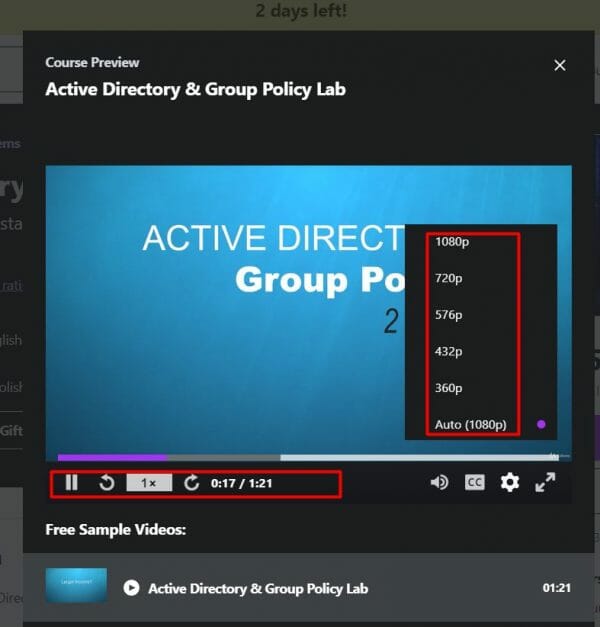Given how much of the world now revolves around technology, it’s no surprise that more and more people are aiming to learn to code. However, traditional education systems aren’t the right fit for everyone, and so online learning platforms have developed exciting new ways to teach.
Two of the big innovators in the online learning space are Udemy and BitDegree, two online learning platforms seeking to decentralize education by allowing just about anyone to take or create courses. This guide will cover everything you need to know about these two platforms to help you choose the right one for your learning needs.
Let’s then explore Udemy vs BitDegree!
Table of contents
What is Udemy?
Founded in 2010, Udemy is an online learning platform designed with both learners and instructors in mind. Udemy allows just about anyone to apply to become an instructor and start making their own courses on a wide range of subjects, which has led to a huge library of over 130,000 courses.
By removing education or qualification requirements to becoming an instructor, Udemy allows knowledge to be shared with learners much more openly and freely. What’s more, many of the courses on Udemy are free to take, making education even more accessible for learners on a budget.
What is BitDegree?

BitDegree began life in 2017 as a concept for an online learning platform built around gamified learning and blockchain technology. Its core concept is to make learning more accessible by rewarding anyone who takes one of its courses with BitDegree Tokens, a cryptocurrency that can be redeemed for further courses or converted into Ethereum.
This makes BitDegree’s courses much more affordable than other platforms, as completing a course comes with a tangible reward with real-world value. As with Udemy, BitDegree doesn’t have specific educational requirements to sign up as an instructor, further adding to its mission statement of making education more accessible.
Udemy vs BitDegree
Udemy and BitDegree share a lot of the same core concepts and characteristics – they’re both online learning platforms that offer a huge range of courses by allowing anybody to become an instructor as long as they have the knowledge to create a course.
However, in practice there are a lot of differences between the two platforms – so let’s compare them in terms of some of the most important factors to consider when picking your ideal learning platform.
Course Quality
One of the biggest factors to consider when picking a learning platform is how good the courses that it offers are. Course quality applies not just to the content of courses, but also to their production values – such as the quality of video components or interactive elements. So how do Udemy and BitDegree stack up when it comes to course quality?
Udemy
Since just about anyone can make a course on Udemy with very little vetting, course quality can be highly variable. While there are undoubtedly some fantastic courses to be found on Udemy, there are also a lot of lower-quality courses to sort through before you can find the best options.

In terms of production values, Udemy has very few requirements. Courses must have at least 30 minutes of video, five separate lectures, and be filmed in 720p or 1080p. The audio must also be in stereo and of high enough quality that it is “not distracting to students”, and text-to-speech software isn’t allowed. Beyond these requirements, there’s not much more quality control on Udemy.
BitDegree
Like Udemy, BitDegree puts few requirements in place to become an instructor, which can lead to widely varying quality across its courses. However, the platform does have fairly strict (if basic) quality standards which help to ensure courses at least meet a baseline production quality.
BitDegree’s quality requirements include:
- Clear, audible sound with no background noises or humming
- Audio in stereo and synced to the video
- Clear, non-blurred video
- Content must not be older than a year in terms of relevance, and should be reviewed and updated every 6 months
- Courses should have at least 5 lectures, and text courses should have at least 10,000 words
Verdict
While both platforms hold the same issue of un-vetted instructors delivering courses to varying degrees of quality, BitDegree’s stricter and more comprehensive requirements ensure that a baseline of quality is always met, beating Udemy’s much more relaxed approach.
Course Variety
Another important factor in choosing a learning platform is the variety in its courses – after all, you want to be sure that you can learn about all the subjects you’re interested in. Let’s take a look at the course variety that Udemy and BitDegree offer.
Udemy
Variety is Udemy’s strong suit – it offers an absolutely huge range of courses to study across many different subjects. If you want to study something, then there’s a very good chance you’ll be able to find multiple courses on it on Udemy.
As well as providing a huge range of courses, the platform offers a variety of instructors too. If a course looks like it won’t suit your learning style, chances are you can find the same subject taught by another instructor in a different way, catering to all manner of learning styles.
BitDegree
BitDegree also offers a wide range of courses, although, unlike Udemy, it focuses specifically on programming and technology. Its main categories are Blockchain, Business, Coding & Programming, Data Science, IT Security & Software, Design, Marketing, and Personal Development.

These are also broken down into subcategories to help you find specific subjects more easily. There’s also a decent variety in how these courses are taught – courses can be video-based, text-based, centered on interactive lessons, or a combination of the three.
Verdict
While BitDegree does offer a wide variety of courses to choose from, it simply can’t compete with the range on offer on Udemy. Not only are there thousands of courses in coding and technology-related subjects, but Udemy also offers courses on other subjects, which can help to broaden your skillset even further.
Price
This is another vital consideration to make when looking for online courses in coding – especially if you’re operating on a tight budget. So which offers better value for money – Udemy or BitDegree?
Udemy
Udemy is a great option for affordable learning – many of its courses are completely free, while paid courses range in price from $10-$100. This payment secures lifetime access to the course, avoiding the time pressure of subscription-based alternative platforms.
Udemy’s courses also come with a 30-day money-back guarantee, meaning that even if you start a course and realize it isn’t what you expected or that the teaching style isn’t effective for you, you don’t risk wasting your money.
BitDegree
With BitDegree, pricing is slightly more complex than other platforms. BitDegree’s basic courses are all entirely free, while premium and advanced courses can cost up to $500. You can pay for these courses with regular money, or use Ethereum, BitCoin, or BitDegree’s own cryptocurrency BitDegree Tokens (BDG).

Using BDG is the best option, as you’ll get a 20% discount when paying with Tokens. What’s more, completing courses on BitDegree will reward you with more BDG, allowing you to put them towards further courses or convert them into Ethereum.
Be aware, however, that you’ll need to set up an Ethereum wallet in order to either pay with or receive BDG.
Verdict
This is a close call – both platforms are highly affordable and offer a range of free courses. However, if you’re interested in cryptocurrency, then BitDegree’s use of BitDegree Tokens to provide extra value to courses may be the more appealing choice for you.
Mobile Usability
Not everyone’s schedule is the same, and it can often be hard to find the time to study alongside your job and other commitments. Because of this, it’s useful for learning platforms to make their courses mobile-friendly so learners can access them anywhere. Let’s look at how Udemy and BitDegree tackle mobile learning.
Udemy
Udemy’s mobile support is very strong – the platform provides both a mobile-optimized site and a mobile app that has plenty of handy features, such as offline playback.
The one drawback is that the sheer amount of courses on offer can be hard to navigate on Udemy, let alone when accessing the platform via mobile. It’s therefore a good idea to plan out what you want to study in advance so you don’t have to spend as much time fiddling around on your mobile device trying to find the right course.
BitDegree
BitDegree’s site is mobile-optimized, so you’ll be able to access course content easily enough on any device. However, it falls down when it comes to its mobile app.
While the app does allow you to access courses, lessons, and videos on the go, many users have reported issues with the UI and various usability glitches. It works well enough for some users, but others find it extremely hard to learn with effectively.
Verdict
Udemy is the clear winner in this category – its mobile site and app both offer good functionality, while BitDegree is let down by the issues that users have reported with their mobile app.
Beginner Friendliness
Not everyone looking to learn to code online has prior experience in the field – in fact, it’s more than likely that many of them are total beginners. If you’re new to coding, it’s important that learning platforms ease you in gently and help to explain the basics – so let’s look at how beginner-friendly Udemy and BitDegree are.
Udemy
There are tons of beginner-friendly courses on offer on Udemy. What’s more, beginner subjects are often taught by multiple instructors, giving you plenty of choice to find a teaching style that works for you.

However, this can be a double-edged sword – with the amount of courses on offer, it may be hard for beginners to decide which courses are the right ones to get started with. Another issue is that Udemy doesn’t offer much in terms of guided progression – it’s up to the learner to find courses that advance their knowledge from beginner-level to more advanced subjects.
BitDegree
BitDegree offers clearly labeled courses designed specifically for beginners, helping to ease them into the world of coding with simple-to-understand courses that don’t require prior knowledge. The same goes for intermediate and advanced courses – they’re also clearly labeled, helping learners plot a course through particular subjects and advance their skills.
Another helpful feature is the comments section included in each video – here, learners can ask questions and get specific guidance about anything they don’t understand.
Verdict
While Udemy provides a good range of beginner-friendly courses, it doesn’t do much to guide beginners through their learning to gradually advance their skill level. BitDegree, on the other hand, provides a clearer structure to courses, and the comments feature is very handy for getting help with anything beginners may have trouble with.
Professional Development
For some learners, coding is merely an interesting new hobby they want to pick up. For others, though, it’s a pathway to a new career or promotion, which makes professional development features a vital part of any good learning platform. So, let’s see what Udemy and BitDegree have to offer when it comes to professional development.
Udemy
Udemy’s approach to professional development is fairly minimal. Completed courses provide a certificate you can add to your resume, but that’s about it. Individual instructors may offer advice or guidance to help you progress, but Udemy as a platform does little to help.

It’s therefore left up to individual learners to choose the right courses to learn the new skills they need to progress. On the other hand, Udemy does offer courses in subjects beyond coding, so you may be able to find general courses that offer advice on job applications, building a portfolio, writing a resume, and so on to aid employability.
BitDegree
Like Udemy, BitDegree also offers certificates for completed courses – however, these aren’t accredited by any major industry bodies. It does offer more structure in terms of development, however, with a range of Learning Paths that collect multiple courses into one bundle to guide you through a topic from beginner-level to expert.
These are geared towards specific roles, such as Web Developer, Games Designer, and Android App Developer. However, there are only 7 options currently, which means you’re limited to a very basic set of options.
Verdict
Both Udemy and BitDegree could do better when it comes to professional development. However, BitDegree gains the edge with its more understandable course progression and its Learning Paths – although these could definitely be expanded to include further options.
Final Verdict
Udemy and BitDegree each have their fair share of strengths and weaknesses, which makes it hard to pick an outright winner. As such, the better option largely depends on what you want to get out of the learning platform.
Udemy offers a superior range of courses thanks to its huge number of instructors, catering to a variety of learning styles and goals. It’s also highly affordable, and with lifetime access to courses and robust mobile support, it’s a great option for learners with busy schedules who want to learn on the go without any time pressure.
BitDegree, meanwhile, offers a genuinely new and innovative approach to online learning thanks to its focus on gamification, blockchain technology, and BitDegree Tokens. These Tokens offer additional value to learners, helping them to pay for future courses or build up a cryptocurrency portfolio. BitDegree’s quality standards are also stricter than Udemy’s, meaning you’re guaranteed a higher baseline in terms of course quality.
Of course, Udemy and BitDegree aren’t your only options for online learning. There are plenty of other options out there, so it pays to do your homework and lookup several options before you choose your platform.
For example, there’s also Zenva, which offers over 250 courses for $20 per month, a useful mobile app, and plenty of support for beginners with courses covering the basics and specific learning paths to advance through a subject. There are many other platforms to consider, too – so even if your heart is set on Udemy or BitDegree currently, make sure to check out the competition as well!
Did you come across any errors in this tutorial? Please let us know by completing this form and we’ll look into it!

FINAL DAYS: Unlock coding courses in Unity, Godot, Unreal, Python and more.






